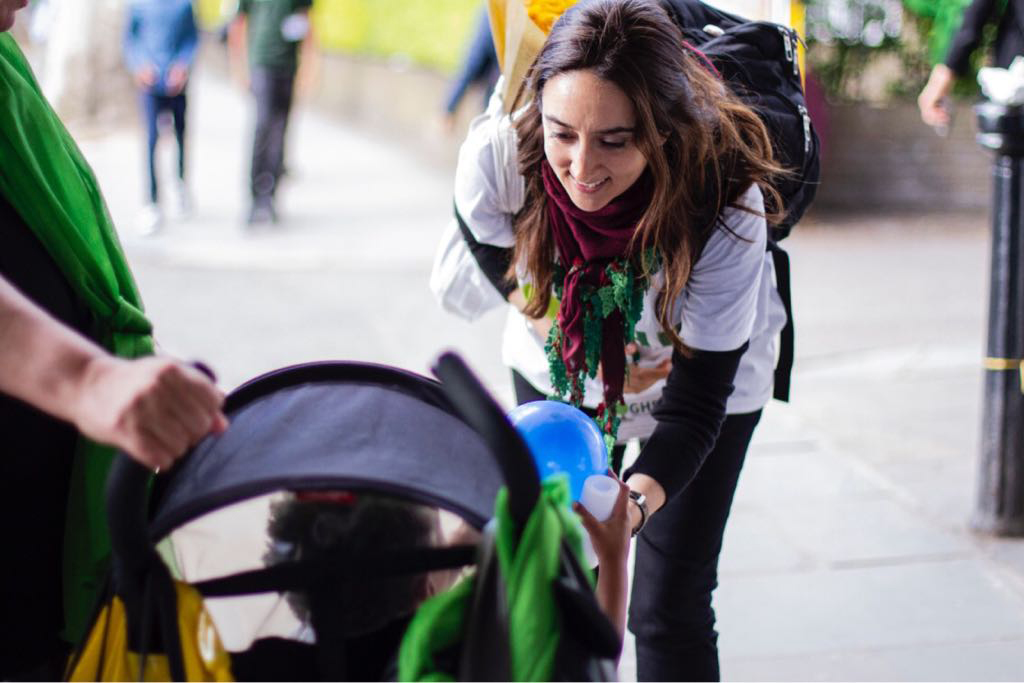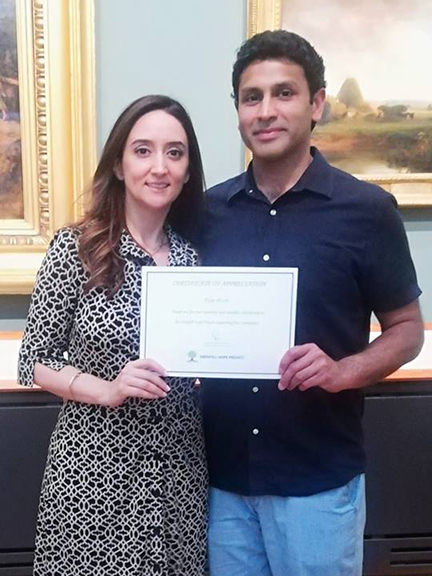
By Karen Shih
When London’s Grenfell Tower apartment building went up in flames in June 2017, Melissa Kizildemir Brigante, MA SID’07, was on maternity leave. But living in London, just miles from the tragedy that claimed 72 lives and injured dozens more, she couldn’t just sit and watch it happen.
“I knew from my background that a lot of people would need psychological first aid,” says Brigante, who had worked for years in disaster relief. “I didn’t know anything about disaster response in the UK but I went there the first day to see if I could volunteer. It was complete chaos—absolutely nothing was organized.”
Brigante leapt into action, reaching out on Facebook for psychosocial volunteers. Forty signed up within hours, and 400 more joined in the next few days. She trained them in batches and sent them to the site, where they worked with the local community to help process their experiences. They provided psychological first aid at the street level, realizing emotionally overwhelmed and distraught survivors, witnesses and community members could not check themselves into the formally set up disaster mental health support clinics in the crucial early days.
It felt only natural for Brigante, who started working in disaster relief in her home country of Turkey when she was just a teenager, to step up in a time of need. Throughout her career, she’s helped implement psychosocial programs for refugee camps on the Iraqi border, children in earthquake-prone Turkey, immigrant families in New Orleans and more recover from disasters.

“I loved being in the field but wanted to develop tools to help organizations work more effectively: How can we serve more people with fewer assets?” she says. She chose to pursue a master’s degree in sustainable international development at Heller, where she put her newfound knowledge into action at her practicum placement with OxFam America during Hurricane Katrina.
“The people who had the cars and the means of understanding the news could get away,” she says. But people who were poor, disabled, elderly or immigrants were left behind in the flooding. At OxFam, her job was to figure out how to identify vulnerable populations before disasters by creating better projections and tools, which she wrote about for her master’s paper.
After graduating from Heller, Brigante obtained a master’s degree in management from Harvard University where she earned the Derek Bok Public Service Prize for her creative initiatives in community service. She also worked on a homelessness prevention program with the Boston mayor’s office before moving to London in 2010.
That’s how she found herself poised to use her skills and experience to start up the charity, the Grenfell Hope Project. She’s now expanded from providing mental health services to hosting resilience-building trainings in partnership with Mental Health First Aid England.
“We’re filling the gaps of mental health support and continue to serve the otherwise unserved. We wanted to make sure nobody was left out,” Brigante says.
For example, she found counselors fluent in different languages to serve the large immigrant community who did not speak English. She also organized the first Grenfell mental health coordination seminar, attended by 75 representatives from organizations like the British Red Cross and the National Health Service, to advocate Do No Harm principles and World Health Organization guidelines on working without inflicting more trauma on the beneficiaries.
“If you see someone bleeding, you don’t go and ask how they got cut. You just try to help them stop bleeding,” she says. “It should not be different for mental health. You must offer first aid.”
She hopes others—particularly first responders—can learn from her experiences with the Grenfell Hope Project through a new documentary and paper she is working on. Though it’s been a year and a half since the fire, the consequences are ongoing, as people continue to suffer mental and physical consequences of the fire, of still being displaced, and feeling neglected as a community. “We’re going to offer help as long as there is the need."
